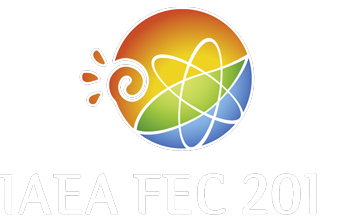Speaker
Mr
Frederic Clairet
(CEA)
Description
Plasma turbulence is a key parameter governing the confinement quality of magnetically confined plasmas. It is responsible of a substantial particle and heat transport that affects the performance of a nuclear fusion device. More detailed knowledge and understanding are constantly needed and requires more and more precise measurements with, in turn, improved diagnostic performance. Swept frequency reflectometry, traditionally devoted to electron density profile measurements, have been constantly progressing in terms of sensitivity (S/N ratio) and sweeping rate. In this paper the symbolic limit of 1µs sweep time with a dead time in between sweeps of 0.25 µs has been recently reached by the Tore Supra (TS) reflectometers, which are today successfully experienced on the ASDEX Upgrade (AUG) tokamak. Such a high sampling rate of 800 kHz improves the observation of the plasma temporal dynamic and high radial resolution from the edge to the plasma center. They provide plasma measurements for a broad and continuous radial range, from the edge to the center, at an acquisition rate which competes now with fixed frequency systems. In addition to fluctuation profiles or kr spectra during L-I-H transition with high temporal resolution, it extends the observation to high frequency coherent modes and microinstabilities such as TEM and ITG over the entire plasma with a high radial resolution. We can follow the temporal evolution of an edge coherent oscillation around 100 kHz and see how at the ELM crash, this mode temporarily disappears and then rapidly recovers. The radial dependency of the spectra also provides an observation of the interplay between localized MHD neoclassical tearing modes and Trapped Electron Modes (TEM). Comparisons with synthetic diagnostic simulations coupling a 2D reflectometry full-wave code with gyro-kinetic (GENE) turbulence simulations have been performed. It has contributed to the assessment of the measurements as well as the numerical codes. It has pointed out the role of the plasma rotation and provided insights in the turbulence structure.
| Country or International Organization | FRANCE |
|---|---|
| Paper Number | EX/P6-31 |
Author
Mr
Frederic Clairet
(CEA)
Co-authors
Ms
Anna Medvedeva
(IPP)
Ms
Christine Bottereau
(CEA)
Mr
Diego Molina
(CEA)
Dr
Garrard Conway
(Max-Planck-Institut fuer Plasmaphysik)
Mr
Hugo Arnichand
(CEA)
Dr
Roland Sabot
(CEA, IRFM)
Mr
Sebastien Hacquin
(CEA)
Prof.
Ulrich Stroth
(Max-Planck-Institut für Plasmaphysik)

